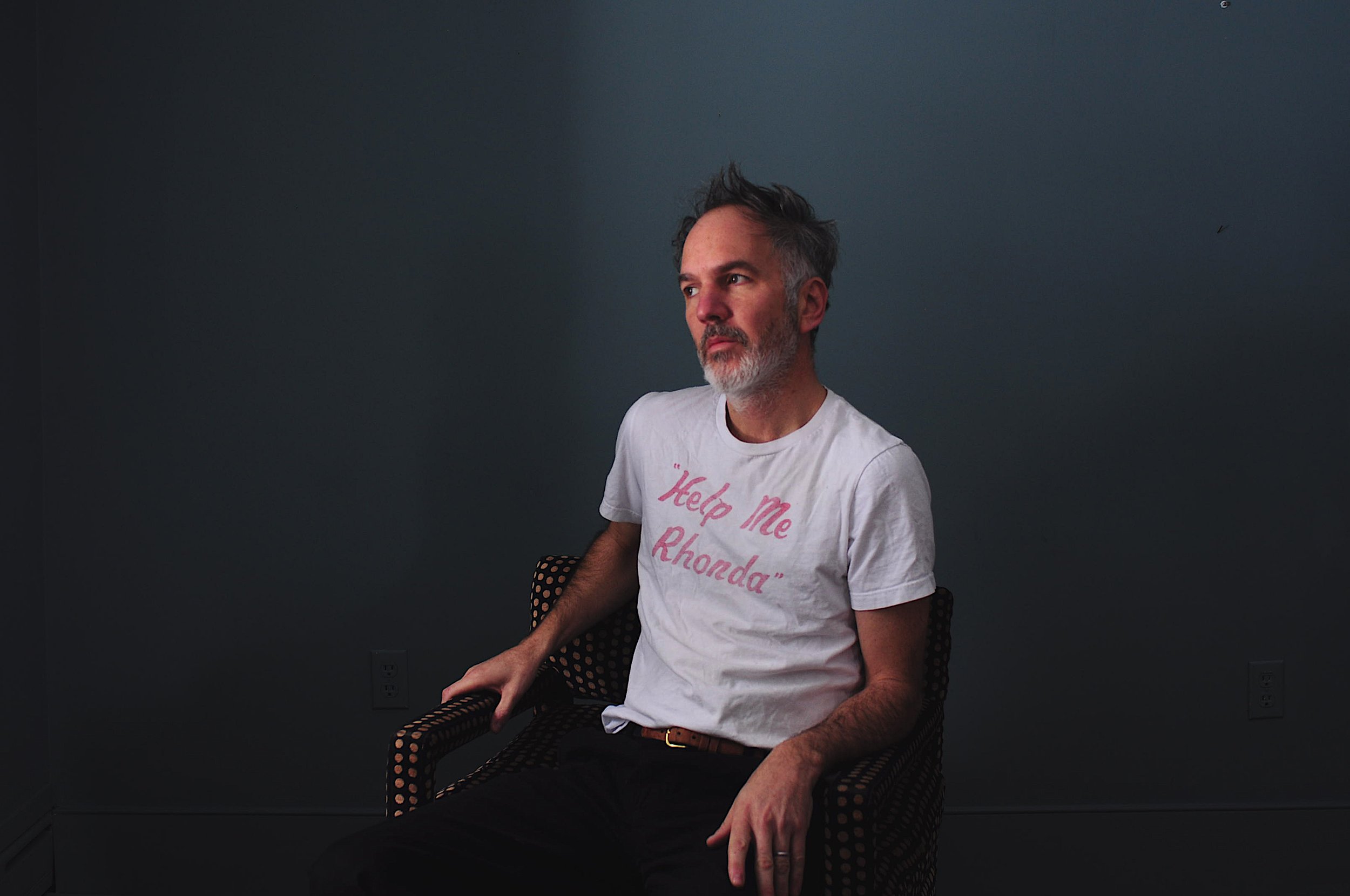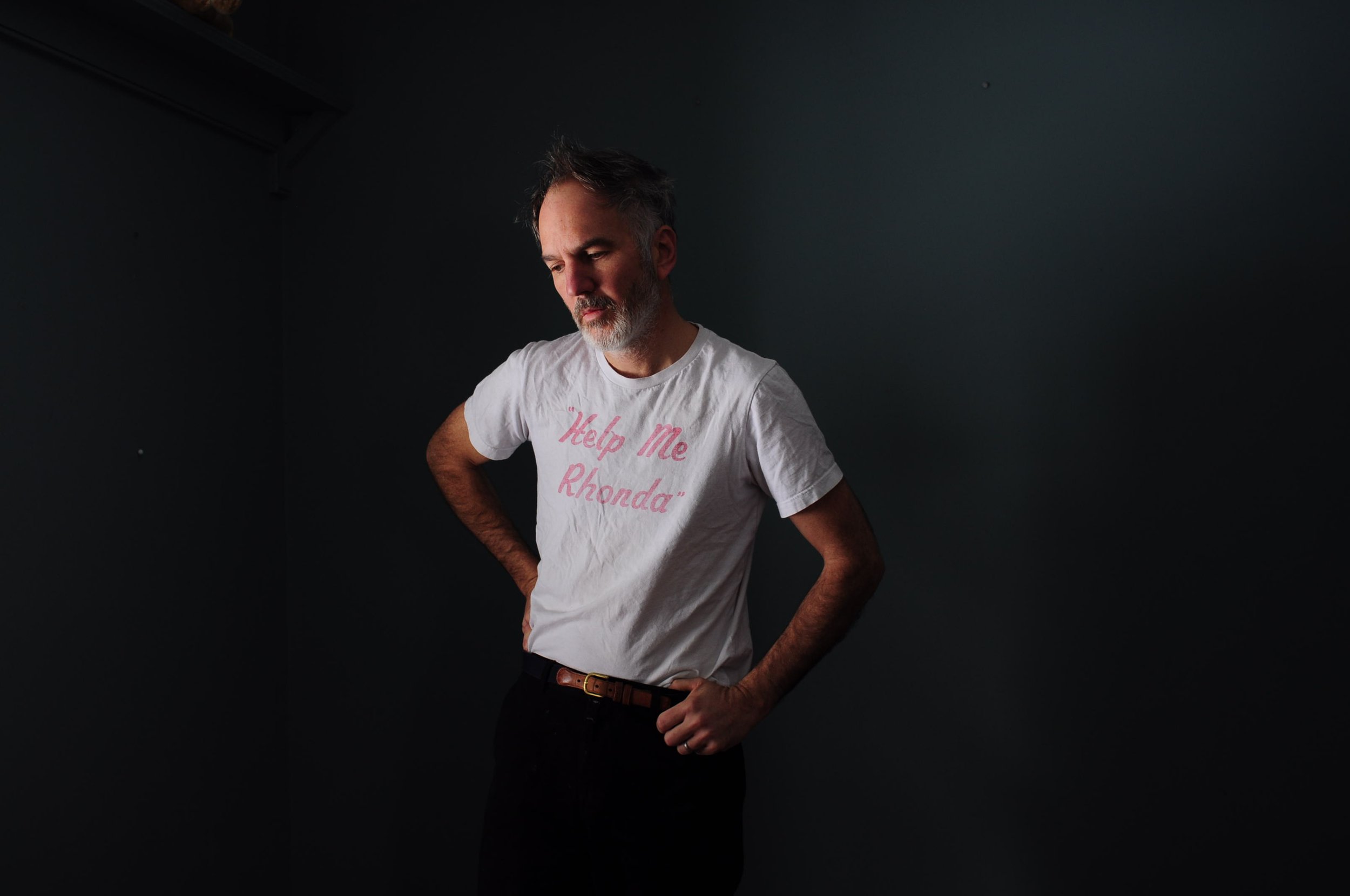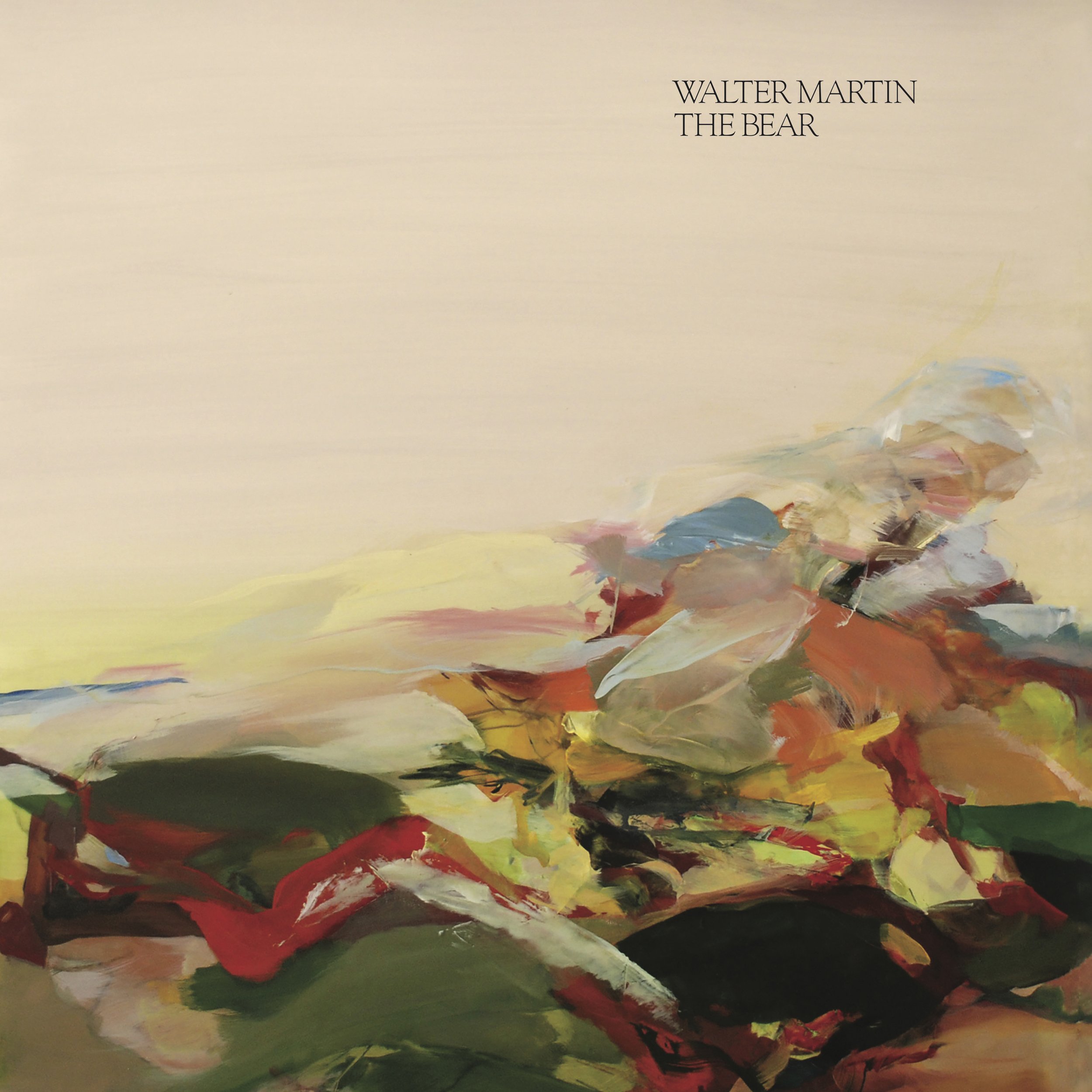Click Image to Download!
“I take on a lot of film and TV work so that I’m free to make the kind of albums I want to make,” says Walter Martin. “I’ve never been keen on mixing art and commerce, so I try to keep those ambitions totally separate.”
Indeed, Martin’s poignant new record, The Bear, may be his most commercially unambitious work yet. And that’s precisely the point.
“I don’t have a manager or anything, and the audience for my albums is pretty small,” he continues, “but honestly I’m just trying to build a body of work that I’d be ok to be buried with—hopefully later rather than sooner.”
As a solo artist, Martin exists in a peculiar space outside the traditional music industry, a place that’s allowed him to remain remarkably pure, if largely under the radar. Eight albums in, though, and he finds himself breaking through despite his best efforts. Take a listen to The Bear and you’ll see why. There’s obvious touchstones from past generations—Jonathan Richman, Randy Newman, the kind of artists who’ve followed their own voice to create unique universes independent of the ebb and flow of the culture at large—but one would be hard pressed to find a contemporary songwriter quite like Martin, who’s released a wide and striking body of music over the last decade: some serious, some humorous, some for children, some definitely for midlife crises, but all with a singular perspective that hits at something bittersweet and human. At the heart of Martin’s work is a plainspoken sense of wonder and beauty and gratitude, a take on life that feels both funny and sad and somehow manages to leave you feeling genuinely okay about the fact that we’re all going to die.
“The Bear feels like the kind of album I’ve been building towards for my entire career,” Martin reflects. “I don’t think I’ve had the nerve to be this honest, this autobiographical before, but more than anything I’ve ever written, these songs explain who I am and why I make this stuff.”
For an artist this multifaceted, that’s no easy feat. Written during the cold, bleak winter of 2020-21, The Bear is an unexpectedly warm and inviting collection, one focused on growth and family and the power of human connection. The songs here are gentle and engaging, with spacious arrangements often centered around fingerpicked electric guitars and romantic piano flourishes from Oscar-nominated Minari composer Emile Mosseri, and Martin’s idiosyncratic vocals are similarly amiable, delivered with the loose, casual demeanor of an old friend who’s pleased as punch you decided to stop by. Like much of Martin’s catalog, The Bear is chock full of delightfully vivid imagery and fueled by an infectious love of language, but this time around the lyrics leave more to the imagination, stepping away from explicit narrative forms in favor of more abstract and intuitive streams of consciousness. “Sun burns through in blurry blue / the cookbook stacked beneath my shoe / the kid’s asleep my soul I keep / like a spoon beside a spoon,” he sings on the hypnotic “Baseball Diamonds. “But I woke up so late this time / my liver wrapped around my spine / and that damn song in my head / if it’s not yours well I guess it’s mine.” What ultimately emerges is a lifetime’s worth of deeply personal snapshots and reflections all jumbled together, a family photo album dumped out on the floor and gathered back up into a swirl of moments and memories that manage to tell a million different stories all at once.
“These songs come from a more melancholic place than a lot of my other stuff,” Martin explains. “There’s a lot about my family, my family history, myself, and my uncertain place in the world. If there was any central theme or whatever on my mind when I was writing, I guess it was the way that families and relationships can be beautiful and vital but also heartbreaking at the same time.”
A D.C. native, Martin is perhaps better known as a New Yorker these days thanks to his work as a founding member of The Walkmen, the influential indie rock band who helped pave the way for the city’s rock and roll renaissance in the early 2000s. After the critically acclaimed group announced their indefinite hiatus in 2013, Martin surprised everyone—including himself—by launching his solo career the following year with an award-winning children’s album, We’re All Young Together. Inspired by his adventures in fatherhood and his lifelong love affair with the music of the 1950s and ’60s, the record challenged traditional notions of what “kids’ music” could be, bringing together members of The Yeah Yeah Yeahs, The National, and Clap Your Hands Say Yeah among others in a joyful ode to innocence and discovery. In the years to come, Martin would go on to release six more similarly lauded solo albums prompting glowing coverage everywhere from The New Yorker to NPR, which declared his work to be “the kind of music that can bring tears to your eyes from marveling at all the beauty in the world.” Outside of his solo releases, Martin has contributed music to a broad array of film and television projects, as well, soundtracking Tik Tok’s first TV ad campaign, working with Phoebe Bridgers and The National’s Matt Berninger on a tune for Zach Galifianakis’s Between Two Ferns movie, writing the theme song for family favorite Missing Link, and landing both a Clio Award and a Bronze Award at Cannes for his commercial songwriting.
“I really enjoy all the film and TV work and it’s great exercise for my brain,” says Martin, “but projects like that often require you to be catchy and bright and upbeat all the time. After you do that for a while, you need to switch gears, so I guess The Bear is sort of an antidote to that stuff—and probably vice versa.”
At the time, Martin had just left New York City after two-and-a-half-decades, moving upstate with his wife and children to a property with an old schoolhouse that he began converting into a recording studio. The building was cold and empty at first, with only a stove for heat, but it proved to be an ideal place to isolate and write every day. Encouraged in part by his newly rural surroundings, Martin found himself penning tunes that were full of natural imagery, songs that were imbued with wonder but also an undeniable sense of foreboding. Focused on himself and his family, the tracks were wordier than anything he’d ever written, full of playful rhythms and intricate internal rhymes, and the lyrics seemed to sometimes spill out faster than he could sing them.
“I wanted to make sure the songs could stand alone before I started to dress them up,” Martin explains, “so I initially recorded them on my phone with just my voice and guitar. It forced me to really focus on the lyrics, to pour myself into the words and reach down deep for a lot of the images and stories.”
With the core structures of the songs ready to go, Martin headed to the Los Angeles studio of longtime friend and collaborator Sean O’Brien (The National, Chvrches, Taylor Swift) to flesh them out, surrounding himself with an all-star band of musicians including Mosseri, guitarist Harrison Whitford (Phoebe Bridgers, Matt Berninger), and drummer Josh Adams (Beck, Devendra Banhart) for basic tracking sessions. Once back in New York, he enlisted yet a few more friends for overdubs, calling on GRAMMY-nominees Josh Kaufman and Eric D. Johnson of Bonny Light Horseman as well as keyboardist Sam Kassirer (Josh Ritter, Craig Finn), who also mixed the album.
“Every one of those musicians brought so much beauty and insight to the record,” says Martin, “but working with Emile in particular was a thrill. I freaked out when I heard the music in Minari and asked him to play on the record, and then he came in and laid down these kind of Debussy, Liszt-style parts I’d been fantasizing about without me even having to say a word.”
The resulting songs walk an artful line between folk intimacy and classical sophistication as they contemplate life, death, and everything in between. Album opener “Hunters In The Snow” sets the stage, with Martin drifting from scene to scene as if strolling past a series of paintings in a museum gallery. Each image suggests a thought, each thought suggests a story, each story suggests an image; perhaps there’s no direct narrative, but by the end, you’ve inevitably absorbed the song’s essence by emotional osmosis. The uneasy “Easter” evokes the anxiety and uncertainty the past few years have brought for us all, while the bittersweet “New Green” mixes sadness and comfort as it considers the families we’re born to and the families we make, and the good-natured title track offers hope and humor even in the face of hardship and disappointment. “Well I had a dream that I was in a mid level rock and roll band / Played every shithole nightclub across this whole entire land,” Martin sings over breezy guitars and loping percussion. “When I woke up I was glad to see that I’d left that life behind / By then I was bald broke and 39 / Wasn’t exactly my plan, no no no / So I left the city lights and now I’m living my own dream / Married the local beauty queen / Built ourselves a home / Watch the wavy water running down the stream / Making babies and raising chickens out here where the buffalo roam.”
“I want people to feel like I’m someone they can trust when they listen to this music,” Martin explains. “The only way I can do that is to give as much personal detail as possible when I write and just hope that transparency makes people feel a sense of comfort and connection.”
Comfort and connection are integral to Martin’s work on The Bear, and he examines them from a variety of angles throughout the album. The waltzing “Hiram Hollow,” for instance, toys with American folk traditions as it wrestles with the pain of saying goodbye to a loved one; the hazy “Not My Mother” hints at Leonard Cohen as it meditates on the hurt that can come from letting the wrong voices inside our heads; and the gorgeous “The Crow Symbolizes Love” reflects on a lifetime of lessons learned through romance and heartbreak. But it’s perhaps album closer “The Song Is Never Done” that best encapsulates Martin’s quest to make sense of himself and his world through art, balancing wit and sincerity in equal measure as he confesses, “Well I’m trying to write the perfect song / No it’s not this one it’s another one I’ve been writing for so long / Where I explain so perfectly what it’s like to be and what is so frightening / And what my life really means and how I find meaning in what I see / And what I understand about eternity and the way I want my children to remember me / And I want to say it all so eloquently and make all the rhymes nice and tight / It’s a lot of work man but it’s coming along you see.”
For Walter Martin, it doesn’t get more honest than that.











